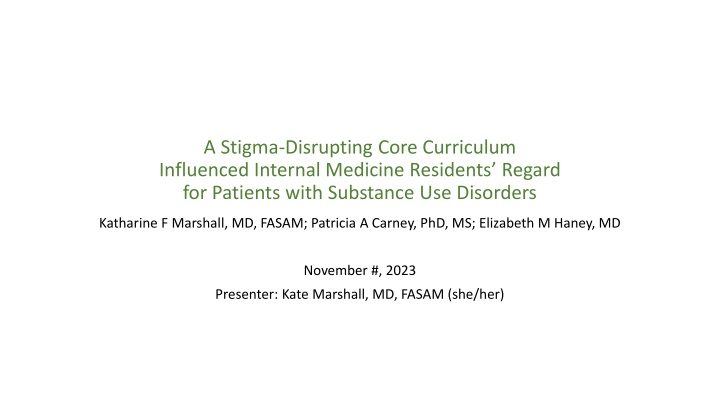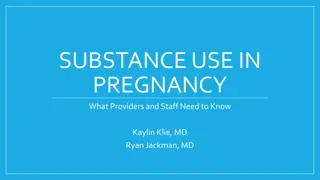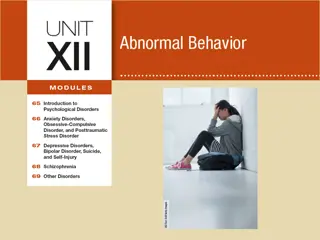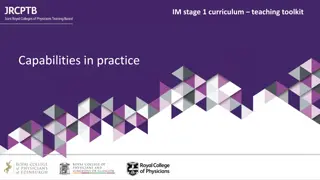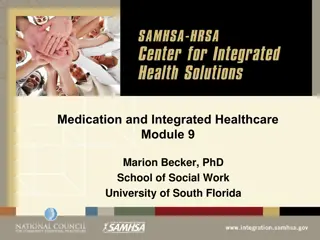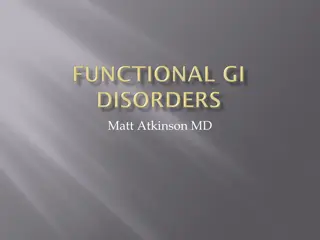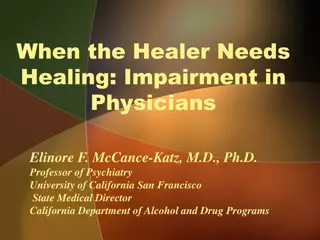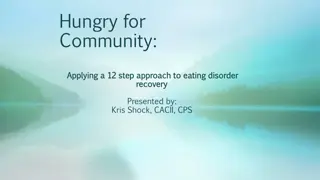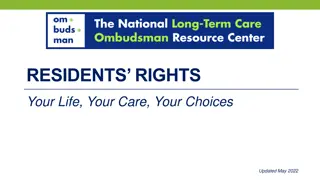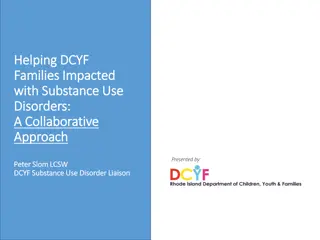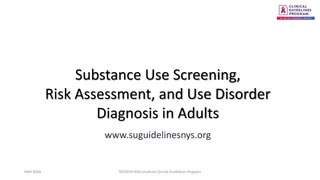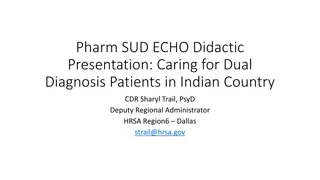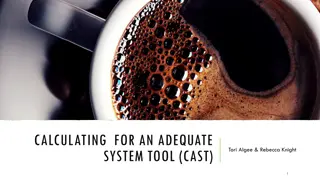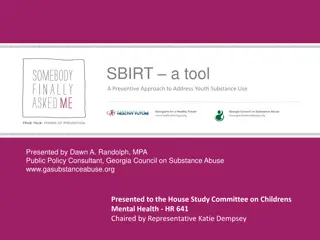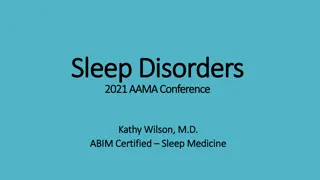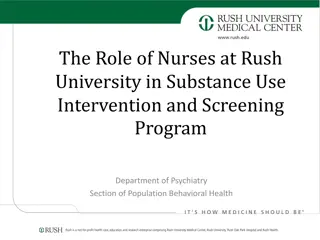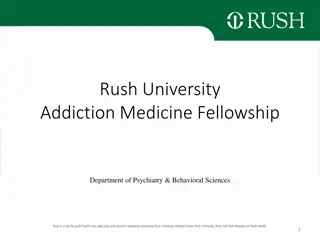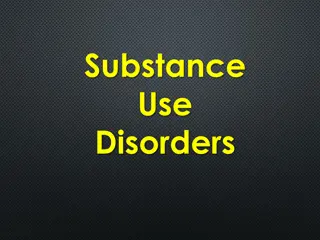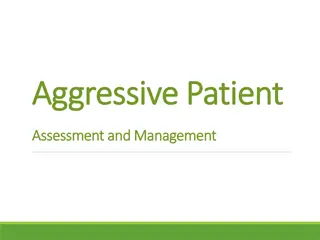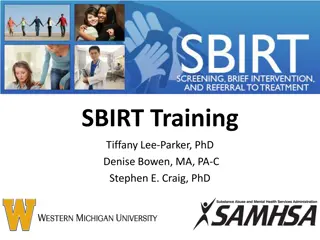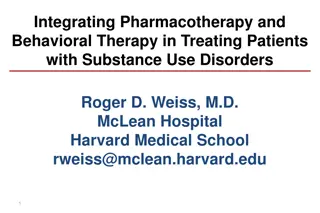Enhancing Internal Medicine Residents' Approach to Patients with Substance Use Disorders
This study focuses on developing and implementing a stigma-disrupting curriculum to improve internal medicine residents' attitudes and knowledge regarding patients with substance use disorders. By addressing provider stigma and enhancing preparedness, the aim is to promote positive regard and increase the willingness of generalist providers to offer appropriate care for individuals with substance use disorders. The research emphasizes the importance of educational interventions in combating stigma and reducing health disparities in the treatment of substance use disorders.
Download Presentation

Please find below an Image/Link to download the presentation.
The content on the website is provided AS IS for your information and personal use only. It may not be sold, licensed, or shared on other websites without obtaining consent from the author.If you encounter any issues during the download, it is possible that the publisher has removed the file from their server.
You are allowed to download the files provided on this website for personal or commercial use, subject to the condition that they are used lawfully. All files are the property of their respective owners.
The content on the website is provided AS IS for your information and personal use only. It may not be sold, licensed, or shared on other websites without obtaining consent from the author.
E N D
Presentation Transcript
A Stigma-Disrupting Core Curriculum Influenced Internal Medicine Residents Regard for Patients with Substance Use Disorders Katharine F Marshall, MD, FASAM; Patricia A Carney, PhD, MS; Elizabeth M Haney, MD November #, 2023 Presenter: Kate Marshall, MD, FASAM (she/her)
Disclosures I have no financial conflicts of interest to disclose
Acknowledgements The Samuel H. Wise Fellowship in General Internal Medicine at Oregon Health & Science University REDCap, under grant support by the Oregon Clinical and Translational Research Institute Providence St. Vincent Internal Medicine Residency in Portland, Oregon Peer support specialists at the Mental Health and Addiction Association of Oregon (MHAAO)
Background One critical barrier to treatment of substance use disorders (SUDs) is the low number of generalist providers who are willing and able to provide it Degree of provider stigma is directly correlated with failure to provide or refer patients with SUD for appropriate treatment Stigma and lack of access to care amplify health disparities Wakeman, et al., 2016; McGinty, et al., 2020; Stone, et al., 2021; Farahmand, et al, 2020; Gaither, et al., 2018; Kunins, et al., 2007; Schoneich, et al., 2023.
Background Resident physicians negative attitudes and low interest in treating patients with SUDs have been reported to worsen during training Graduate medical education is an important setting for an intervention designed to counteract attitudinal deterioration and promote interest in treating patients with SUD Prior curricular interventions have sought to improve preparedness to care for patients with SUD or to reduce stigma, but rarely both Avery, et al., 2016; Avery, et al., 2019; Meltzer, et al, 2013; Truncali, et al., 2021
Objective Design, implement and evaluate: a comprehensive curriculum in SUD care for internal medicine residents using anti-stigma messaging techniques with the aim of increasing practice preparedness knowledge positive regard for patients with SUD
1=Strongly disagree; 2=Disagree; 3=Not sure but probably disagree; 4=Not sure but probably agree; 5=Agree; 6=Strongly agree. Please indicate the extent to which you agree with the following statements regarding patients with OPIOID USE DISORDER: Methods 1 2 3 4 5 6 Working with patients like this is satisfying. 1 2 3 4 5 6 Insurance plans should cover patients like this to the same degree they cover patients with other conditions. There is little I can do to help patients like this. R I feel especially compassionate toward patients like this. Patients like this irritate me. R 1 2 3 4 5 6 1 2 3 4 5 6 1 2 3 4 5 6 1 2 3 4 5 6 I would not mind getting up on call nights to care for patients like this. Treating patients like this is a waste of medical dollars. R Patients like this are particularly difficult for me to work with. R I can usually find something that helps patients like this feel better. I enjoy giving extra time to patients like this. 1 2 3 4 5 6 1 2 3 4 5 6 1 2 3 4 5 6 1 2 3 4 5 6 I prefer not to work with patients like this. R 1 2 3 4 5 6 R= item is reverse scored. Christison, et al., 2002.
Methods Wakeman, et al., 2015.
Methods Core Competencies 1) Perform age, gender and culturally appropriate unhealthy substance use screening 2) Effectively assess patients with unhealthy substance use 3) Provide brief interventions to patients with unhealthy substance use 4) Demonstrate effective counseling methods to help prevent unhealthy substance use 5) Refer patients with substance use disorders to treatment settings that provide pharmacotherapy for relapse prevention 6) Recognize, treat or refer co-morbid medical and psychiatric conditions in patients with substance use conditions 7) Refer patients with substance use disorders to appropriate treatment and supportive services 8) Be aware of the ethical and legal issues around physician impairment from substance use and of resources for referring potential impaired colleagues, including employee assistance programs, hospital based committees, and state physician health programs and licensure boards 9) Identify the legal and ethical issues involved in the care of patients with unhealthy substance use 10) Provide pharmacologic withdrawal to patients with substance dependence 11) Provide or refer for treatment for relapse prevention in patients with substance use disorders, both pharmacotherapy and psychosocial counseling Anti-Stigma Messaging Strategies 1. Use of person-centered language 2. Sympathetic narratives 3. Emphasis on societal influences 4. Emphasis on treatability Jackson, et al., 2010; McGinty and Barry, 2020
Curriculum Overview Session Topic Competencies* 1 2, 6 Improving Care for Patients with Substance Use Disorders (SUD) Effect of stigma, trauma and heredity on substance use; harm reduction Foundations in SUD Care Prevalence and morbidity; origins and current state of regulations; treatment efficacy Peer Perspectives in SUD Discussion with people with lived experience Diagnostic Skills in SUD Care Screening, diagnosis, stages of change, brief intervention, referral Ethics in SUD Care Surgical candidacy, pain management and physician impairment Management of Opioid Use Disorder Withdrawal, medication treatments Management of Alcohol Use Disorder Withdrawal, medication treatments Management of Sedative-Hypnotic and Stimulant Use Disorder Withdrawal, medication treatments Reflections in SUD Care Perspective-taking through reflective writing and art exposure 2 1, 6 3 n/a 4 1, 2, 3, 4, 7 5 8, 9 6 5, 6, 7, 10, 11 7 5, 6, 7, 10, 11 8 6, 7, 10, 11 9 n/a *Key to recommended competencies according to Jackson, et al., in brief: 1) Screening 2) Assessment 3) Brief intervention 4) Counseling 5) Referral for or provision of pharmacotherapy 6) Comorbid conditions 7) Referral for treatment and supportive services 8) Ethics and legal issues in physician impairment 9) Ethics and legal issues in patients with SUD 10) Withdrawal management 11) Relapse prevention
Results Of 29 eligible residents 19 (66%) completed the pre-survey 19 (66%) completed the post-survey 14 (49%) completed both Residents who completed both surveys reported having attended on average 53% of the 9 offered sessions (range 33%-77%)
Results Pre Post P-value 0.04a Mean Opioid MCRS (SD) 45.6 (9.3) 51.0 (5.7) 0.01a Mean Alcohol MCRS (SD) 45.9 (8.0) 50.9 (7.9) 0.04b Prepared to diagnose (%) 57% 100% 0.04b Prepared to treat (%) 43% 86% 0.27a Knowledge score (% correct) 62% 67% a=paired t-test b=McNemar s test
Results Pre Post P-value 0.04a Mean Opioid MCRS (SD) 45.6 (9.3) 51.0 (5.7) 0.01a Mean Alcohol MCRS (SD) 45.9 (8.0) 50.9 (7.9) 0.04b Prepared to diagnose (%) 57% 100% 0.04b Prepared to treat (%) 43% 86% 0.27a Knowledge score (% correct) 62% 67% a=paired t-test b=McNemar s test
Results Pre Post P-value 0.04a Mean Opioid MCRS (SD) 45.6 (9.3) 51.0 (5.7) 0.01a Mean Alcohol MCRS (SD) 45.9 (8.0) 50.9 (7.9) 0.04b Prepared to diagnose (%) 57% 100% 0.04b Prepared to treat (%) 43% 86% 0.27a Knowledge score (% correct) 62% 67% a=paired t-test b=McNemar s test
Results Pre Post P-value 0.04a Mean Opioid MCRS (SD) 45.6 (9.3) 51.0 (5.7) 0.01a Mean Alcohol MCRS (SD) 45.9 (8.0) 50.9 (7.9) 0.04b Prepared to diagnose (%) 57% 100% 0.04b Prepared to treat (%) 43% 86% 0.27a Knowledge score (% correct) 62% 67% a=paired t-test b=McNemar s test
Results Pre Post P-value 0.04a Mean Opioid MCRS (SD) 45.6 (9.3) 51.0 (5.7) 0.01a Mean Alcohol MCRS (SD) 45.9 (8.0) 50.9 (7.9) 0.04b Prepared to diagnose (%) 57% 100% 0.04b Prepared to treat (%) 43% 86% 0.27a Knowledge score (% correct) 62% 67% a=paired t-test b=McNemar s test
Discussion A stigma-disrupting core curriculum in addiction medicine for internal medicine residents appears to improve positive regard for patients with SUD as well as increased self-reported preparedness to diagnose and treat SUD
Discussion Strengths of curriculum: Virtual (synchronous or asynchronous) or in-person Longitudinal or concentrated learning experience Can be delivered by specialists or generalists
Discussion Limitations of study: low sample size modest response rate lack of a comparison group self-reported outcomes
Discussion This curriculum study adds to prior work suggesting that modifying existing attitudes and addressing stigma are important components of clinician education in the care of people with SUD. Future research could include measurement of the impact of attitude change on physician behavior or relative efficacy of each messaging strategy utilized Already adapted as hybrid virtual/in-person for 2-week elective at UCLA IM residency in 2022-2023
References Wakeman SE, Pham-Kanter G, Donelan K. Attitudes, practices, and preparedness to care for patients with substance use disorder: Results from a survey of general internists. Subst Abus. 2016;37(4):635-641. doi:10.1080/08897077.2016.1187240 McGinty EE, Stone EM, Kennedy-Hendricks A, Bachhuber MA, Barry CL. Medication for Opioid Use Disorder: A National Survey of Primary Care Physicians. Ann Intern Med. 2020;173(2):160-162. doi:10.7326/M19-3975 Stone EM, Kennedy-Hendricks A, Barry CL, Bachhuber MA, McGinty EE. The role of stigma in U.S. primary care physicians treatment of opioid use disorder. Drug Alcohol Depend. 2021;221:108627. Farahmand P, Arshed A, Bradley MV. Systemic Racism and Substance Use Disorders. Psychiatric Annals. 2020;50(11):494-498. doi:10.3928/00485713-20201008-01 Gaither JR, Gordon K, Crystal S, et al. Racial disparities in discontinuation of long-term opioid therapy following illicit drug use among black and white patients. Drug Alcohol Depend. 2018;192:371-376. doi:10.1016/j.drugalcdep.2018.05.033 KUNINS HV, BELLIN E, CHAZOTTE C, DU E, ARNSTEN JH. The Effect of Race on Provider Decisions to Test for Illicit Drug Use in the Peripartum Setting. J Womens Health (Larchmt). 2007;16(2):245-255. doi:10.1089/jwh.2006.0070 Schoneich S, Plegue M, Waidley V, et al. Incidence of Newborn Drug Testing and Variations by Birthing Parent Race and Ethnicity Before and After Recreational Cannabis Legalization. JAMA Netw Open. 2023;6(3):e232058. doi:10.1001/jamanetworkopen.2023.2058 Connolly D, Gilchrist G. Prevalence and correlates of substance use among transgender adults: A systematic review. Addict Behav. 2020;111:106544. doi:10.1016/j.addbeh.2020.106544 Avery J, Han BH, Zerbo E, et al. Changes in psychiatry residents attitudes towards individuals with substance use disorders over the course of residency training. Am J Addict. 2017;26(1):75-79. doi:10.1111/ajad.12406 Avery JD, Taylor KE, Kast KA, et al. Attitudes Toward Individuals With Mental Illness and Substance Use Disorders Among Resident Physicians. Prim Care Companion CNS Disord. 2019;21(1):18m02382. doi:10.4088/PCC.18m02382 Ellen C. Meltzer MD F MSc, PhD AS, BA SB, et al. Stigmatization of Substance Use Disorders Among Internal Medicine Residents. Substance Abuse. 2013;34(4):356-362. doi:10.1080/08897077.2013.815143 Truncali A, Silva K, Stickney I, Johnson M, Holt CT. An Asynchronous Curriculum to Address Substance Use Disorder Training Needs for Medical and Surgical Residents. Journal of Public Health Management and Practice. 2021;27(1):S168-S173. doi:10.1097/PHH.0000000000001305 Christison GW, Haviland MG, Riggs ML. The medical condition regard scale: measuring reactions to diagnoses. Acad Med. 2002;77(3):257-262. doi:10.1097/00001888-200203000-00017 Wakeman SE, Pham-Kanter G, Baggett MV, Campbell EG. Medicine Resident Preparedness to Diagnose and Treat Substance Use Disorders: Impact of an Enhanced Curriculum. Substance Abuse. 2015;36(4):427-433. doi:10.1080/08897077.2014.962722 Jackson AH, Alford DP, Dub CE, Saitz R. Internal medicine residency training for unhealthy alcohol and other drug use: recommendations for curriculum design. BMC Med Educ. 2010;10:22. doi:10.1186/1472-6920-10-22 McGinty EE, Barry CL. Stigma Reduction to Combat the Addiction Crisis Developing an Evidence Base. New England Journal of Medicine. 2020;382(14):1291-1292. doi:10.1056/NEJMp2000227
